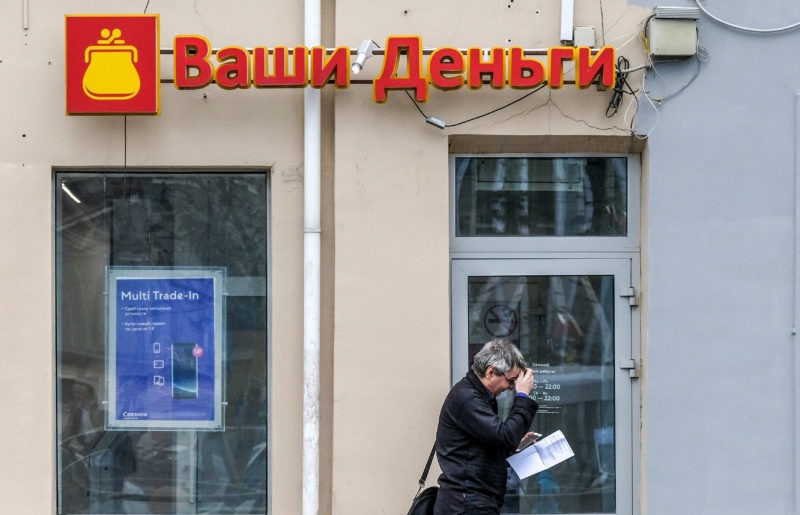Easy money: Russians trapped by weight of consumer loans
Russians tempted by loans from the likes of pictured Moscow payday lender VashiDengi find once they are lured in it can be hard to get back on an even financial keel (Yuri KADOBNOV)
<p>Moscow (AFP) – Saint Petersburg entrepreneur Yulia Galich says she does not know what she would do without consumer loans.</p><p>She took out an 80,000-ruble ($1,300) loan when she wanted to go to Israel on holiday with her husband and 10-year-old son in August. </p><p>The 48-year-old, who founded a make-up studio and sells professional beauty products, has for years relied on loans to also support her business.</p><p>"It’s addictive. Once you start taking out loans you cannot stop," Galich told AFP. </p><p>She is one of millions of Russians who rely on personal loans and credit cards, contributing to a relentless credit boom. </p><p>Russians, whose real disposable incomes have been falling since 2014, are borrowing more and more to support their businesses and lifestyle or even make ends meet. </p><p>But loans in the country come with notoriously high interest rates, and many economists warn of the risks of the growing consumer debt.</p><p>Galich complained that even though she tries to pay the interest on her loans on time, she always ends up owing money to the bank.</p><p>"I don’t know how this works and how they achieve this, it’s impossible to understand."</p><p>She said she prefers to rely on credit cards rather than borrowing cash, but such loans tend to be more expensive, with annual interest rates sometimes reaching 49 percent.</p><p>Fifty one percent of Russians have an outstanding debt, up from 26 percent a decade ago, according to a study by state pollster VTsIOM released in August.</p><p></p><p>- ‘Serious problem’-</p><p></p><p>The decline in living standards and the erosion of Russian consumers’ purchasing power stem from lower global oil prices and several rounds of sanctions against Moscow since it annexed Crimea in 2014 and supported separatists in east Ukraine.</p><p>Poor Russians are particularly vulnerable to payday lenders who give out small cash loans at enormous, triple-digit interest rates. </p><p>Such loansharks are ubiquitous in Russia and can be found everywhere from gleaming malls to drab bedroom communities.</p><p>Many operate on the edge of legality, even though the Russian central bank has made efforts to rein them in.</p><p>As of October 1, unsecured consumer debt stood at 8.7 trillion rubles ($139 billion), according to central bank figures. That compares with 7.4 trillion rubles as of January 1.</p><p>Economy Minister Maxim Oreshkin, speaking in late July, called the unsecured lending boom a "very serious social problem" that could blow up in 2021.</p><p>In the fourth quarter of 2018, a third of loans were taken out by households where debt payments ate up 60 percent of their monthly income, pushing many to take out new loans to repay old ones, Oreshkin has said.</p><p>But analysts say consumer lending has also supported the Russian economy, which is expected to grow just around 1.3 percent this year.</p><p>"It’s one of the main drivers of growth," said Natalia Orlova, chief economist at Alfa Bank.</p><p>The amount of defaulting loans has also grown, fuelling a boom in Russia’s notoriously aggressive debt collection business.</p><p>To help recover debts, authorities ban delinquent borrowers from leaving Russia. </p><p>According to the National Association of Professional Collection Agencies, some 10 million Russians — or every fourth borrower — struggle to repay loans. </p><p>About 60 percent of debtors cite financial hardship as the primary reason for the arrears. </p><p></p><p>-‘Come when they kill you’-</p><p></p><p>Viktor Semenduyev, senior vice president at Credit Express Finance, a debt collection agency, said he had recently seen an uptick in business as more and more borrowers fall into default.</p><p>Speaking at his offices as some 20 employees behind him were calling clients, he said Russians, like people in other countries, resent debt collectors but claimed the industry has been purged of its worst excesses after the adoption of a law in 2016. </p><p>The legislation stipulated that collectors cannot call a debtor more than twice a week or at night, threaten them or destroy their property.</p><p>Olga Skudutis, a retired veterinarian, painted a starkly different picture, however.</p><p>The 63-year-old, who has struggled to pay off loans due to ill health and other reasons, said she had been terrorised by debt collectors.</p><p>She estimated her outstanding debt at around 700,000 rubles and said roughly half of her 23,000-ruble pension has gone on debt payments for the past decade.</p><p>Collectors threatened her, vandalised her mailbox and glued up her door lock.</p><p>Police have remained deaf to her pleas for help.</p><p>"They have not killed you!" she said they told her a few years ago. "Come when they kill you."</p><p>mak-ij-apo-as/ma/cdw</p><p></p>
Disclaimer: Validity of the above story is for 7 Days from original date of publishing. Source: AFP.


